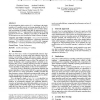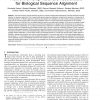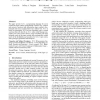2007 search results - page 63 / 402 » Using general-purpose programming languages for FPGA design |
PLDI
1997
ACM
15 years 2 months ago
1997
ACM
A major research goal for compilers and environments is the automatic derivation of tools from formal specifications. However, the formal model of the language is often inadequat...
ICFP
2008
ACM
15 years 9 months ago
2008
ACM
We investigated the relative merits of C++ and Erlang in the implementation of a parallel acoustic ray tracing algorithm for the U.S. Navy. We found a much smaller learning curve ...
TC
2010
14 years 8 months ago
2010
—The most pervasive compute operation carried out in almost all bioinformatics applications is pairwise sequence homology detection (or sequence alignment). Due to exponentially ...
ICFP
2008
ACM
15 years 9 months ago
2008
ACM
Earlier studies have introduced a list of high-level evaluation criteria to assess how well a language supports generic programming. Since each language that meets all criteria is...
ICFP
2008
ACM
15 years 9 months ago
2008
ACM
This paper presents AURA, a programming language for access control that treats ordinary programming constructs (e.g., integers and recursive functions) and authorization logic co...



